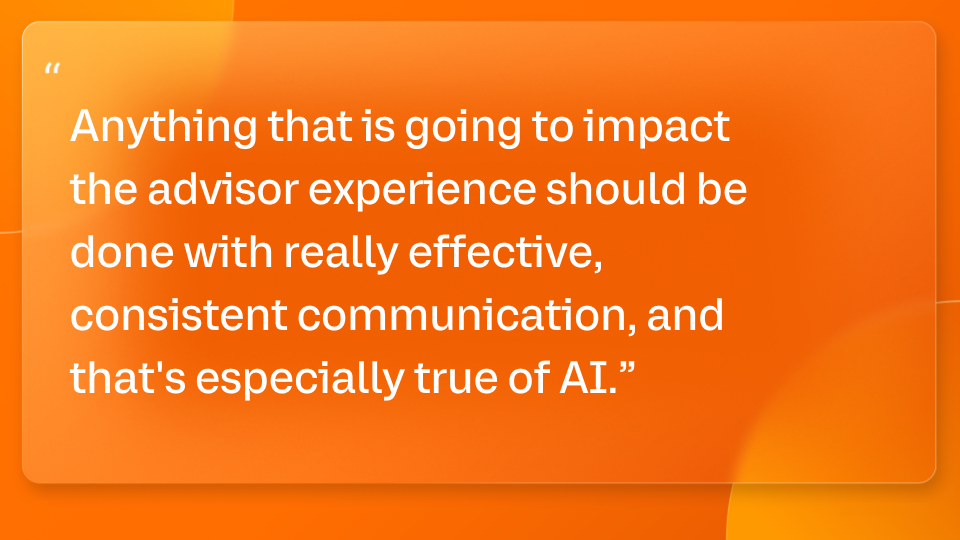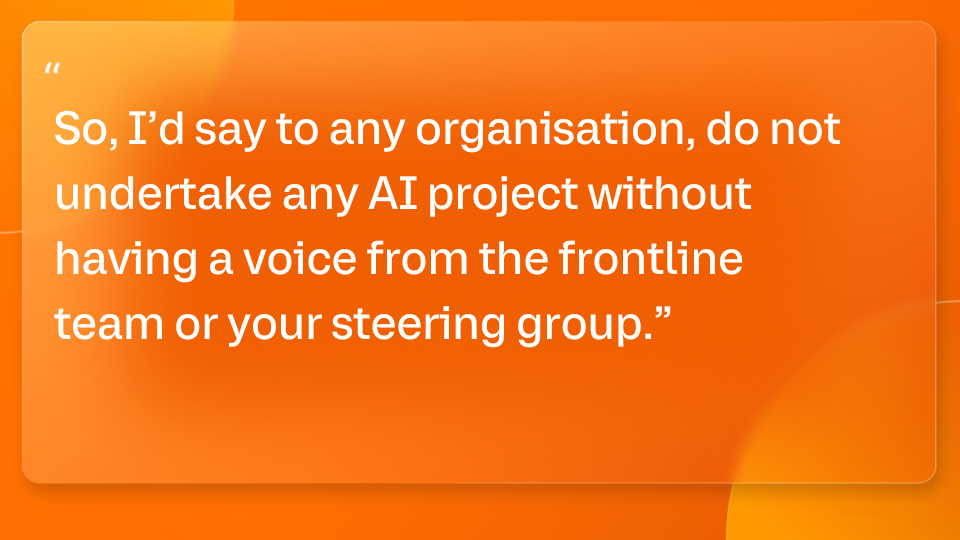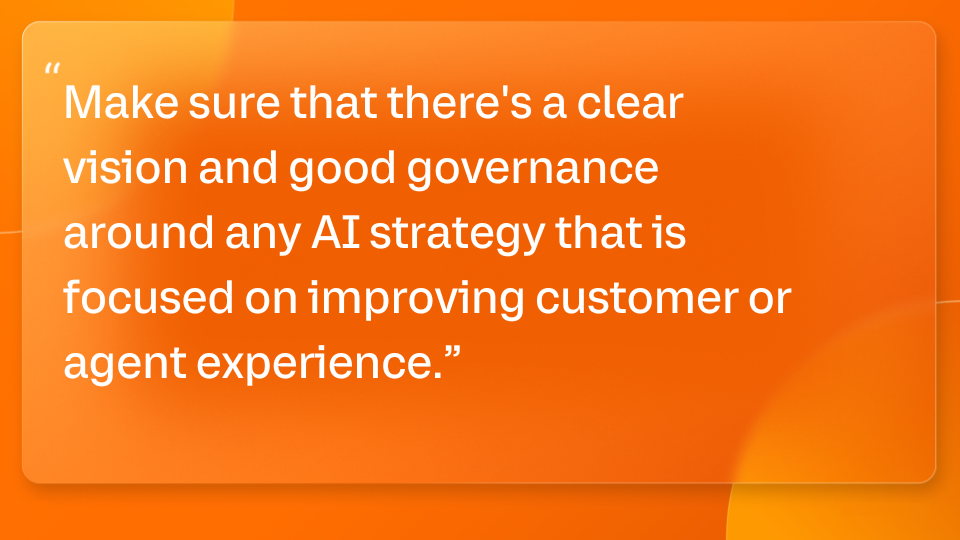Ask the Expert: What Impact Will AI Have on Contact Centres and Agents?

- Nerys’ background and experience in the contact centre industry
- How do contact centre agents feel about AI?
- What are the benefits of AI?
- What practical steps should organisations take when implementing AI?
- Have you seen any organisations nailing AI in the contact centre?
- What does the future hold for AI in contact centres?
- What are the pitfalls organisations should avoid?
‘Ask the Expert’ is a series of interviews RingCentral runs with influential thought leaders from around the world, including UC and CX consultants and analysts. In this series, we aim to find out what’s at the cutting edge of UCaaS and CCaaS.
For this month’s instalment, RingCentral’s Ian Nevin, Director of International Consultant Relations, spoke with Nerys Corfield, Director of Injection Consulting – a contact centre consultant – about the rise of AI and its impact on contact centres, especially how it impacts the role of the contact centre agent.
Can you first tell us a bit about your background and experience in the contact centre industry?
Yes, sure. Well, I spent 18 years working in contact centre outsourcing, managing lots of different customers. I’d say about 70% of my work was for inbound contact centres, and 30% was outbound. I worked for many really big, amazing brands across various sectors, including telecoms, utilities, automotive and education.
From a relatively young age I was responsible for owning the happiness of the clients, the commercials of each client and the operational delivery of the outsourced service. It is a relentless world where you are exposed to many different clients, many different challenges and it creates an inherent focus on delivering excellence and constantly looking to improve contact centre performance.
In 2015 I made the step to becoming an independent consultant. I landed more in the CC Tech space working with vendors and their resellers and I now look to bridge the gap between tech and ops ensuring the ambitions and the realities from the front line are front and centre when navigating the path through CC Tech investment.
As well as conduct audits using a proven framework I judge prestigious awards and take any chance to talk about the realities and the future of contact centres at industry events or on podcasts.
Perfect, thanks. So, from your experience of auditing contact centres and talking to agents, how do they feel about AI?
That’s a really interesting question, and the answer is it all comes down to how well the organisation decides to communicate with the advisor community about the rationale and how the AI will be deployed.

One of the questions I always ask advisors is: out of all the interactions you have in a day, how many of those do you think could be handled by self-service tools and automation?
Most people recognise that there’s still an awful lot of interactions that could be done through self-service, or that should be digitally assisted and the advisors are keen to highlight these ‘intents’ to the businesses who are open to hearing them as a valuable resource.
What about the benefits of AI? What should contact centres expect?
Customer experience benefits
Good question. AI should be supercharging every element of the customer experience. I don’t remember who coined this, but I think it’s spot on – in contact centres, the application of AI can be summarised by four As:
- Analyse – understand who is calling and why they might be calling you
- Anticipate – based on your analysis, determine why a customer might be looking to contact you, if possible intervene with proactive outreach or, if they do make contact determine which channel/agent will be best fit for them
- Augment – make the experience for the customer and the agent better, and
- Automate – when that’s the right thing to do for the customer. The reality is that a lot of customers do want really quick, frictionless experiences and often, self-service delivers that
Employee experience benefits
On the employee experience side, AI and technology is now being used pretty consistently to support the agent experience – for example, virtual agent assistance, better knowledge management, and quality management (QM). Nobody should be doing QM manually in 12 to 18 months’ time because AI can pinpoint the really important analytics and present that in a digestible, actionable way.
This means that, instead of a team leader having to focus on gathering stats and admin, they can just get on with coaching, monitoring, and supporting their advisors on how to improve each interaction. They can also connect with their agents on a more human level, checking in with them on how they are doing, and this improves the employee experience, which in turn improves the customer experience.
What practical steps should organisations take when implementing AI, would you say?
I’d say it’s all about being very clear on the part that your AI will play in analysing, anticipating, augmenting, and automating – and what that means to the advisors, the business and the customer. AI shouldn’t be a standalone strategy; it should be infused throughout the customer and agent experience.
Unfortunately, sometimes agents are forgotten in the communication loop, so they don’t understand the objectives for implementing the AI, or they don’t understand what the broader customer journey is. The result is that agents feel disassociated with AI because they don’t feel they have a voice in that process.

Have you seen any organisations nailing AI in the contact centre? Can you describe what they did and the challenges and benefits they encountered?
At the moment, I’m actually judging a ‘Best application of AI’ category for an annual industry award. I also judged the same category last year. I won’t mention any entries specifically, but there’s a huge difference between what was happening last year and what’s happening this time around, and this is because of the development of large language models and neural networking through generative AI.
People are being very brave on the internally-facing side of things – they are rapidly developing PoCs (Proof of Concepts) and then rolling out generative AI models to support the agents’ knowledge base. That’s paying dividends in terms of consistency of responses – an agent on one channel is more likely to give you the same answer as another agent on another channel. This is really positive.
Companies are also using AI to improve bots and biometric voice recognition to quickly identify people without laborious security questions. There’s a lot of work going on at many different levels. I have yet to learn of organisations using ChatGPT for customer-facing interactions because it’s difficult to predict what it will say. However, people are also working hard on this so that the responses can be consistent and personalised to their company.
To round off, what do you think the future holds for AI in customer service?
Sometimes, I wish I had a crystal ball! Here’s what I think:
1. Voice will take over from text
This will be a great step forward because, over the years, the number of interfaces an advisor is expected to juggle and the amount of data they’re expected to capture whilst managing a conversation has increased so much. This is tricky and frustrating for the advisor. Voice messages (voice notes) will become much more commonplace in direct messaging channels, which will change how people say things and do things, so that will be interesting.
2. Analytics will enable much better customer experiences

We should be able to offer the best channel for the customer and the best path to resolution. We shouldn’t be shifting everyone onto digital channels; we should only shift the people this makes sense for (both from their perspective and the business’ point of view).
And what do you think the potential AI pitfalls are that organisations need to avoid?
Aside from the risks of not giving agents a voice in AI decision-making, a few other potential pitfalls spring to mind.
Be cautious of unexpected outcomes
Firstly, we need to be careful of unintentional consequences from AI. For example, auto summarisation is one of the big use cases for AI. Auto summarisation means that agents won’t need ‘wrap time’ anymore, and that’s usually 10% of the average transaction handling time. This is great, but we need to be careful not to expect occupancy rates to shoot up to, say, 93% and expect an agent to go from call to call to call. This isn’t realistic, as they need a break. Especially if that agent has just been on an emotional call (as often happens in contact centres like social services or claims) or has dealt with a rude or aggressive caller.
Don’t rush to make big changes to headcount
Then there’s the talent versus technology dilemma: how do you balance AI use with investing in real people? It’s a tricky balance. I believe that because 85% of contact centre advisors are from Gen Z, the industry has a naturally high attrition rate as those younger people move on to other roles. With this in mind, it shouldn’t be about cutting headcount; it should be about naturally winding down the number of agents you have as AI improves.
Finally, I’d urge a bit of caution. There’s a bit of a ‘gold rush’ going on with AI, but we don’t want to see what we saw with bots. Many of the first tranche of bots (some still in use today) were ill-considered and thrown out because of top-down edicts – “we need a bot because everyone else has got a bot”.

Many thanks to Nerys Corfield from Injection Consulting for her insights into how AI is impacting contact centres and agents. You can find out more about the RingCentral Consultant Relations Program and portal on our hub.
Originally published Oct 12, 2023, updated Nov 28, 2023
